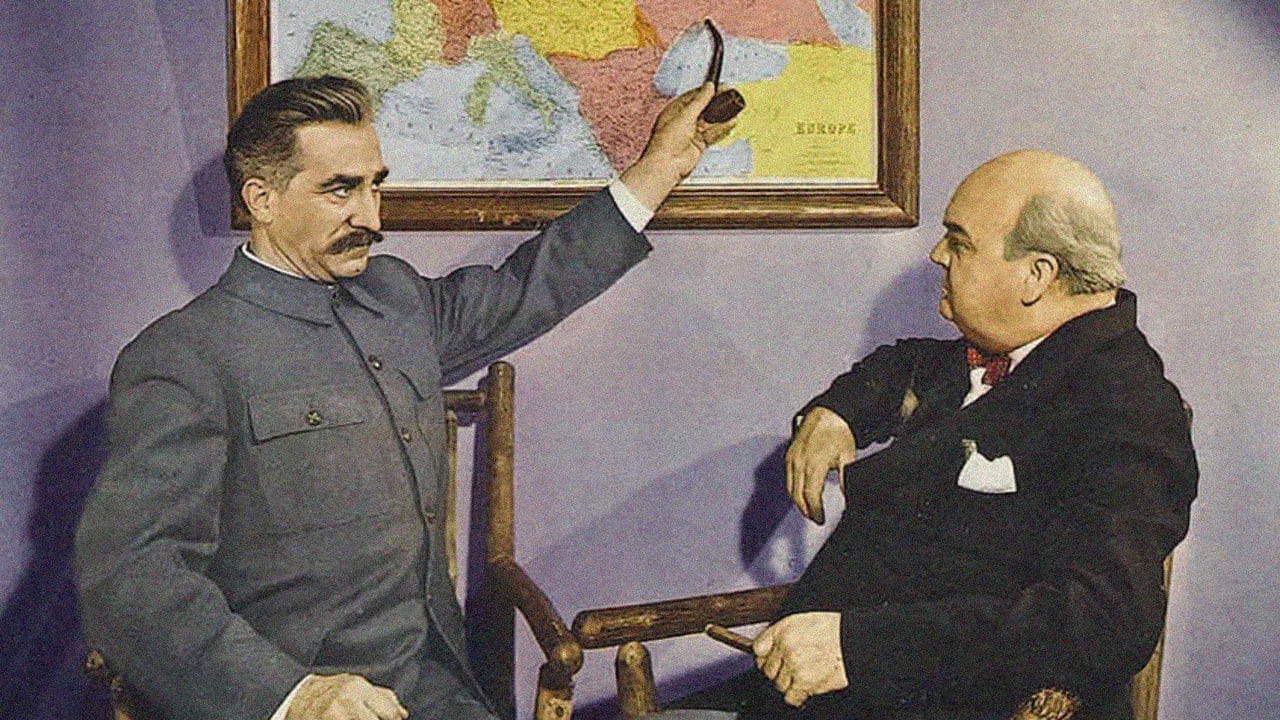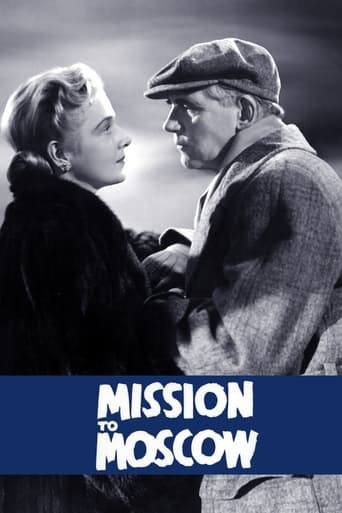

Best movie of this year hands down!
... View MoreAn action-packed slog
... View MoreIt was OK. I don't see why everyone loves it so much. It wasn't very smart or deep or well-directed.
... View MoreBlending excellent reporting and strong storytelling, this is a disturbing film truly stranger than fiction
... View MoreValentine to the Soviet Union, made at the only possible moment it could have been made, at the behest of FDR and with the full resources of Warners. And it looks mighty strange today, seeking to convince wartime audiences that despite capitalism-vs.-communism arguments, the Soviets are an honorable and charming people, Stalin's a good guy with more in common with the U.S. than you'd expect, and the Russians saw what a threat Hitler was long before anybody else did. It's told through U.S. Ambassador Joseph Davies' eyes; Davies himself introduces the picture, then is replaced by an earnest Walter Huston, who manages to retain his dignity and even some gravitas, even through myriad scenes of him meeting politicos, shaking hands, and making pronouncements. But mostly it's about how the Soviets' military power is stronger than suspected, and there are lots of (well-faked) parades, parades, parades. It's sad to see the great Ann Harding in such an uninteresting, wifey role as Davies' Mrs., and Eleanor Parker has almost nothing to do as their daughter but admire the traditional Russian skating and dancing. The music is Max Steiner at his most obvious, and director Michael Curtiz is in no hurry to get to the end. Interesting now as what well-deployed propaganda looked like in 1943, and the New York Times, among others, quite liked it. But it's a slog, and it looks pretty naive now.
... View MoreMission to Moscow (1943)What a bore, a laugh, an epic squandering. There is competance, of course—it's a Warner Bros. film in the 1940s with Michael Curtiz directing—but it's so burdened by its message it never becomes an actual movie about conflicts, characters, and plot.It's pure propaganda. Knowing that, you can watch it with historic curiosity. It is, truly, weird enough to warrant a look if you follow the Roosevelt/Stalin comparison, and the general American attitude to the Soviet Union in the 1940s. You will, however, get bored. It begins with a series of speeches, including an opening explanation by the author of the book the movie builds on. Even when the scenes have some interest, as when the diplomatic family tours the USSR, there is such an obvious attempt to make the Russians wonderful people with a terrific political system it turns your stomach. Not that I need to agree or disagree, I just don't want to be preached to.And so it goes. There are factory visits, parades, ballroom affairs, and lots of preachy talking. It's impossible to care or get absorbed, but it is revealing of one large oddity of WWII: the need of the US to work alongside the USSR in defeating Hitler. The Germans come off badly, of course (the trains are so efficient they won't wait for people who get to the platform late). The Japanese even worse, caricatures who have made a mess of China. The second half of the movie is a different beast, a kind of judicial series of confrontations. It also has the feel of "information" instead of drama. It's well made, fairly well films and edited with clarity, but it can't make a silk purse out of you know what.Warner Bros. fans might enjoy the appearance of an amazing number of actors. Because of all the shifting scenes from country to country, there was a need for a great number of secondary but familiar actors, like the detective from "Mildred Pierce." A good half the actors will seem familiar, even if you can't place what movies you've seen them in. If you love Curtiz (the reason I watched), you'll have trouble seeing his brilliance. Finally, we might expect some kind of political revelation here—and what we see is a kind of admirable but perhaps naive American acting as ambassador to the USSR in the late 1930s. That's the guy who wrote the book, Joseph Davies, and you can see all these good intentions and homespun (Wisconsin style) Americanisms. It doesn't hold up well against the tough characters he was up against all around, from Stalin to Churchill.
... View MoreThe flaws in this film are gigantic and obvious. The scenes of the show trials, to take one example, not only falsify history, but come off as so flat and awkward as to make it impossible to believe any of the confessions. Which makes me wonder: was this just bad writing by an otherwise gifted screenwriter or deliberate sabotage?We know this much: that Davies had final script approval. It shows: he is in every scene and given the last word on every subject. You can imagine him standing over Howard Koch's shoulder, insisting on rewriting this scene and adding extra touches to another. All this must have been maddening to a professional writer at the pinnacle of his career.Which leads to my pet theory: that Koch exacted his revenge by making Davies look like a fool. While the film may appear to be painting Davies in a positive light – it would be hard for him not to be at least likable with Walter Huston playing him – a closer viewing depicts him not only as naïve and gullible, but also self-centered and vain. What else do we make of those scenes – and they keep recurring – in which various Soviet figures tell Davies how insightful, open and honest he was? Davies, of course, never disagrees, but instead launches into another speech in which he assures his friends that he will tell America or the world what's really going on in the Soviet Union. Whether Davies realized it or not, the film shows him as someone who only needs to be tickled under the chin in order to be seduced.Which brings us back to the show trial scenes. Bukharin did as much as he could to defeat Vyshinsky by admitting as much as he had to in order to save his family but denying whatever else he could, while dropping broad hints that none of what he was saying was true. Koch's script does something similar: the confessions of Radek, Bukharin, Yagoda and the rest sound canned and unconvincing and the defendants themselves look more like defeated party functionaries than conspirators. Which is, of course, the truth—it's just not advertised as such.
... View MoreAn odd little movie. "Mission to Moscow" was brought to my attention by a BBC documentary on Stalin in the war years "WWI Behind Closed Doors". It describes the intense diplomatic efforts made by the allies during WWII to bring the Soviet Union into the war against Germany. Leaders in the West were willing to cast a blind eye to Soviet brutality and repression, including the massacre of Polish military officers at Katyn and the establishment of puppet governments in the territories they controlled, in order to keep them on the side of the West. This effort involved swaying public opinion in Western countries, and Joseph Davies' "Mission to Moscow" was cited as an example of this effort. There is an excellent article on Davies in Wikipedia, which describes how keen he was to see only the positive in the Soviet Union. Ironies abound in this film. Molotov appears as a kindly old professorial gent, Stalin is a hopeful visionary yearning for world peace. The glimpses of daily life in the Soviet Union include ice skating parties with piles of food, high fashion for the ladies, English-speaking railroad workers with nothing but love for their country, and American expatriates expressing admiration for the inventiveness of the Russian hosts they are there to help. In fact, while Davies was ambassador, a large number of American expats were being imprisoned by Stalin as counter-revolutionaries, despite having voluntarily emigrated to the Soviet Union to contribute to building a new society. Many petitioned the US Embassy to have their passports restored, and Davies refused to intervene. At one point, the US embassy staff in Moscow threatened to resign en masse. When Stalin consolidated power with the purges of his former associates in 1936 ~ 1938, Davies attended several of the show trials, and in "Mission to Moscow" he is shown nodding knowingly when Bukharin and the other defendants "confess" to their anti-Soviet activities and conspiratorial association with the now arch-enemy Trotsky. In the movie, Davies repeatedly insists that his mission is to see the **real** Soviet Union first-hand, yet in his visits were said to have been highly scripted and organized by the Soviet authorities. In retrospect, Davies comes off as a naïve fool, but seen in the larger context, perhaps someone a little more competent would not have been able to supplied the West with the kind of pro-Soviet view Davies could supply. But let's put history aside for a moment. This is just a bad film. It is stilted, over-scripted, and whatever points it is trying to make are spoon-fed to the audience. Davies had control over the final script, and his scenes come off as highly self-serving: Davies warning of the dangers of war over the objections of more experienced statesmen, Davies being congratulated at every turn by one world leader after the next for his insight into the coming war in Europe. You know pretty much at the beginning of each scene what is going to unfold – a vacation with the family to get away from world affairs ends with a phone call from the White House, a meeting with senators expressing doubt about the strength of Germany will end with Davies convincing them with facts to the contrary. And Walter Huston is just overworked here – he has to carry virtually every scene, because really, Mission to Moscow is mostly about Davies himself. A just plain awful movie and yet fascinating to watch, especially for a glimpse into this brief period of time when the US actually tried to like Stalin, and fascinating also for the fantasy views of Soviet life in the late 1930s. And particularly worthwhile if you also take the time to research the persons and events portrayed in the movie and juxtapose these against the events portrayed in Mission to Moscow. It is a very educational experience. At the time I saw this movie, it was not available on DVD, but could be downloaded from the Warner Brothers movie archive.
... View More